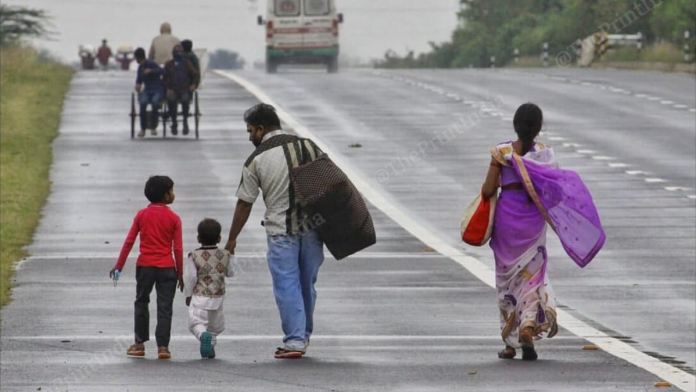![]()
The Niti Aayog’s draft Migrant Labour Policy is a clear statement of intent to better recognise migrants’ contribution to the economy and support them in their endeavours. It puts forward several radical ideas, including the adoption of a rights-based approach and establishing an additional layer of institutions to create a more enabling policy environment for migrants. It proposes a new National Migration Policy and the formation of a special unit within the Labour Ministry to work closely with other ministries. The new structure would bring about much-needed convergence across line departments and would be a huge step towards a universal understanding of the causes and effects of migration as well as the interventions needed.
The policy calls for improving the record on the implementation of the country’s many labour laws that have, by and large, failed to make a difference to the lives of labour migrants. It discusses at length the provisions under the Equal Remuneration Act, The Bonded Labour Act, the Building and Other Construction Workers Act and the Interstate Migrant Workmen Act, among others. The draft also invokes the ILO’s Decent Work Agenda as well as the Sustainable Development Goals which aim to protect labour rights. It acknowledges the challenges of welfare provision to a highly fragmented migrant workforce due to recruitment patterns and the lack of data. It refers to the importance of collective action and unions and there are detailed plans for improving the data on short-term migration, especially seasonal and circular migration. As a statement of goals, the draft contains much to be celebrated.
But the policy needs to delve deeper into the causes underlying the poor implementation of labour laws that are linked to the political economy of recruitment and placement. Labour migrants from rural areas find work in the urban economy and high productivity rural enterprises either through kinship networks or labour market intermediaries. These networks are critical for supplying workers that can be positioned in jobs, where there is a demand for hard-working and controllable workers who will stay tied to the job. One way of ensuring that workers do not leave because of harsh conditions is to bond them through the notorious system of advances. Although illegal, this kind of arrangement is attractive for migrants from relatively disadvantaged backgrounds as they cannot mobilise large sums of money for weddings, housing and repaying loans. There is reference to unfair recruitment practices in the document, but virtually no analysis of why the system persists and how it is enabled by the employment structure of businesses and enterprises.
Another area where the draft needs to be strengthened is addressing gender differences in employment. Domestic work is one of the most important occupations for migrant women from relatively disadvantaged backgrounds. Although the new policy aims to be inclusive of all kinds of marginalised migrants, it could do more to explicitly mention the challenges faced by domestic workers. It would be very easy for them to remain excluded as India has not ratified the ILO Convention on Domestic Workers and The Domestic Workers Bill 2017 has not become law. Other kinds of home-based work, enormously important for female migrants could similarly remain excluded.
Another point to raise here is the apparent ambivalence about the ability of tribal migrants to think for themselves and decide how they access the opportunities offered by migration. Early in the draft we see a commitment to recognising migrant agency, but this is less clear in the section where tribal migration policies are discussed. Tribal migration is constructed as a process whereby recruiters are “luring” or even trafficking them. Domestic work, which is mentioned in this context, is an important source of income for tens of thousands of tribal women from impoverished backgrounds in eastern Indian states. There are, of course, some instances of abuse, but these do not represent the majority experience. There is a need to better understand how migrants themselves weigh up the costs and risks against potential benefits of working in the city. Controlling tribal migration would go against the objective of recognising migrant agency.
To conclude, the draft policy is a good start which could, with a few adjustments, reduce the vulnerability and risks faced by labour migrants and ultimately build a more sustainable model of development.
We are providing practical training (Labor Laws, Payroll, Salary Structure, PF-ESI Challan) and Labor Code, Payroll Consultant Service & more:
- HR-Generalist-Practical-Training: https://oneclik.in/hr-generalist-practical-training/ (PF, ESI, Bonus, Payroll & more)
- Labour Code | Labour Bill (Labour-Law-Practical-Training): https://oneclik.in/labour-law-practical-training/ (Factory, Contact Labor, Maternity Act & more)
- PF – ESI Consultant Service: https://oneclik.in/pf-esi-consultant-service/
- Labor Law, Compliance & HR – Payroll Management
- Advance Excel Practical Training
Get Latest HR, IR, Labor Law Updates, Case Studies & Regular Updates: (Join us on Social Media)
- Telegram Channel: “One Clik”
- Whatsapp Group: https://wa.me/919033016939
- Facebook: One Clik
- Linkedin: One Clik
- Instagram: oneclik_hr_management
- YouTube: One Clik

